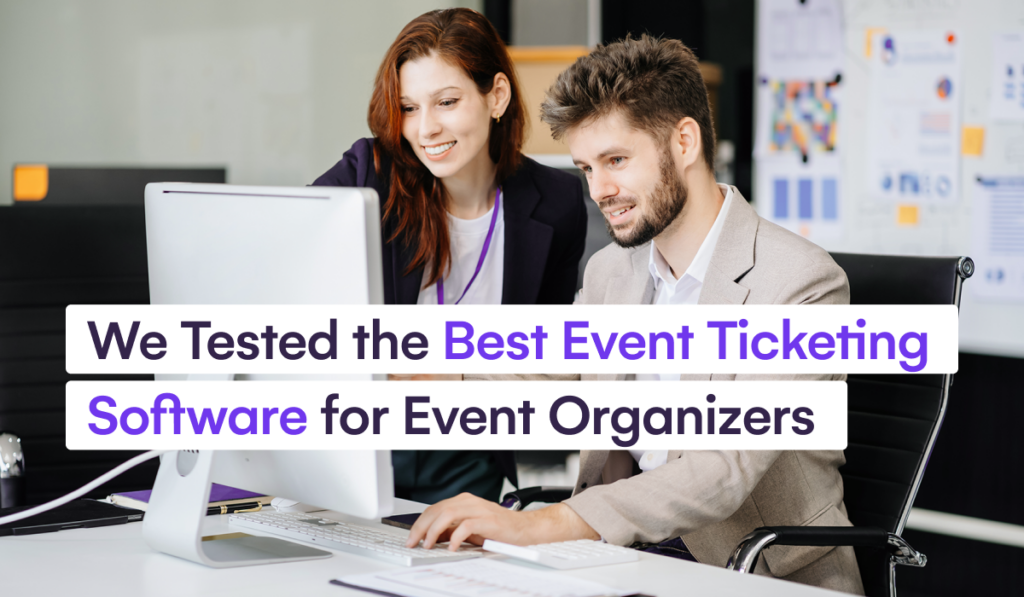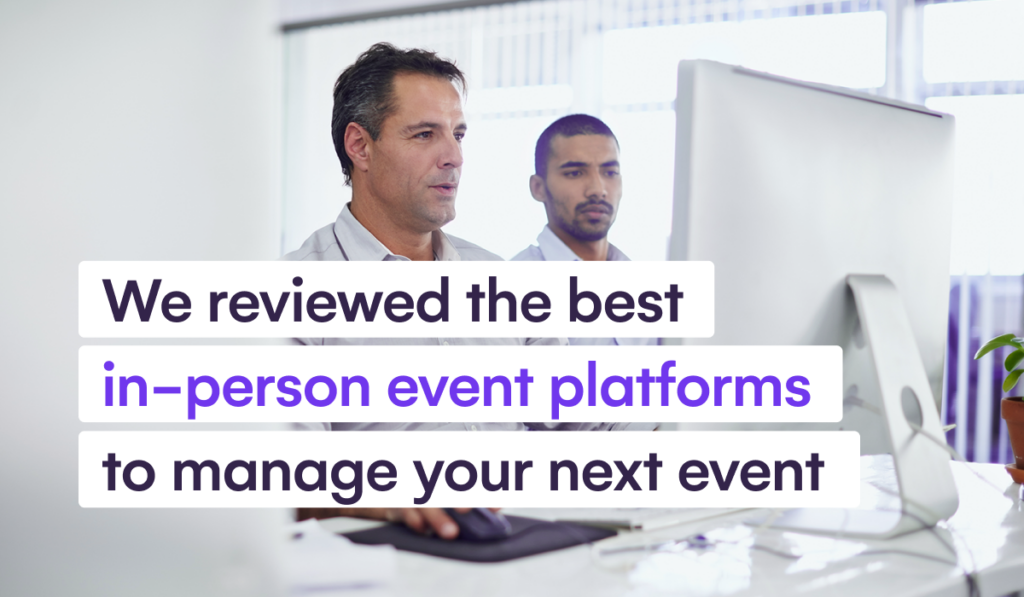We Found the 10 Best Conference Management Software Solutions for Planners

Conference management software makes event planning easier and more efficient. Whether you’re running a small workshop or a major industry conference, the right platform can handle everything from registration to post-event follow-up.
We’ve reviewed the top conference management solutions (including EventsAir‘s comprehensive platform) to help you find the right fit for your events. Each platform brings different strengths to the table, so you can choose one that matches your specific needs and helps create great experiences for your attendees.
What is conference management software?
Conference management software is a digital platform that automates and centralizes event planning, execution, and follow-up. It handles everything from registration to post-event analysis, allowing organizers to create, manage, and track all aspects of their events in one place.
This technology transforms manual event management tasks into streamlined digital processes, helping organizers deliver better experiences while saving time and reducing complexity.
Criteria to consider when choosing conference management software
Selecting the right conference management software is crucial to ensuring a smooth and successful event.
Here are key criteria to consider when choosing the best platform for your needs:
- Ease of use & customization: Conference management software should offer an intuitive interface that easily customizes branding, registration forms, and event pages. Look for platforms that allow quick setup and modification of event elements without requiring technical expertise.
- Registration & ticketing: Efficient software simplifies registration, ticketing, and payment processing. TCS Summit Europe integrated EventsAir’s attendee database with Klay’s self-service kiosks, enabling automated check-in and demonstrating how smart integrations can streamline the on-site experience.
- Attendee engagement tools: Engaging attendees is key, with features like live polling, Q&A, and networking. The Delegate Wranglers demonstrated this effectively at their ‘Nearly Christmas Party’, where gamification features drove a 50-75% participation rate among attendees.
- Integration & mobile access: The software should integrate with other tools and offer mobile access. Look for platforms that connect seamlessly with your existing tech stack and provide reliable mobile apps for both organizers and attendees.
- Analytics & reporting: Analytics and reporting tools help track event success and attendee behavior. Seek platforms that offer real-time data on registration, attendance, engagement, and other key metrics to help inform decision-making during and after the event.
Here’s a list of the top 10 conference management software
- EventsAir
- Cvent
- Whova
- RingCentral Events (formerly Hopin)
- VFairs
- Eventbrite
- Bizzabo
- Stova
- Webex Events (formerly Socio)
- Airmeet
1. EventsAir
EventsAir is an all-in-one native event management platform that handles conferences of any size.
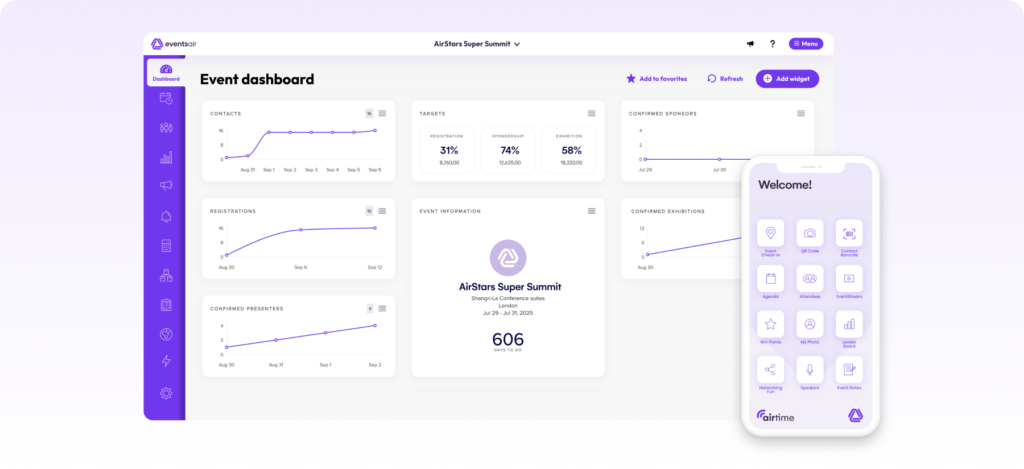
It delivers end-to-end event management through built-in tools that manage the complete event lifecycle, from planning through post-event analysis. We support virtual, hybrid, and in-person events with features designed to maximize attendee engagement and ROI.
Our website builder, event app creator, marketing toolset, and payment processor are all native to the platform—so no more spotty integrations or costly add-ons. Plus, we offer dedicated support and resources to ensure a smooth and successful event.
Key Features:
- Pre-Event planning: Manage tasks, budgets, inventory, and registrations.
- Event marketing: Create and promote websites, email campaigns, and social content.
- Registration: Customize workflows and integrate multiple payment gateways.
- Mobile apps: Deploy branded apps for schedules, speakers, and exhibitor access.
- Check-In: Streamline processes with self-service kiosks and attendee management.
- Lead capture: Digitally track and manage exhibitor sales opportunities.
- Virtual solutions: Host events with 3D environments and live streaming.
- Live event services: Integrate on-site tools for check-in, exhibitors, and gamification.
Pros:
- Comprehensive feature set with a user-friendly interface
- Responsive customer support team
- Scalable for different event types and complexities
- Advanced analytics for tracking attendee interactions
- Versatile for virtual, physical, and hybrid events
Cons:
- Attendee data is stored individually, not in groups (e.g., by company)
2. Cvent
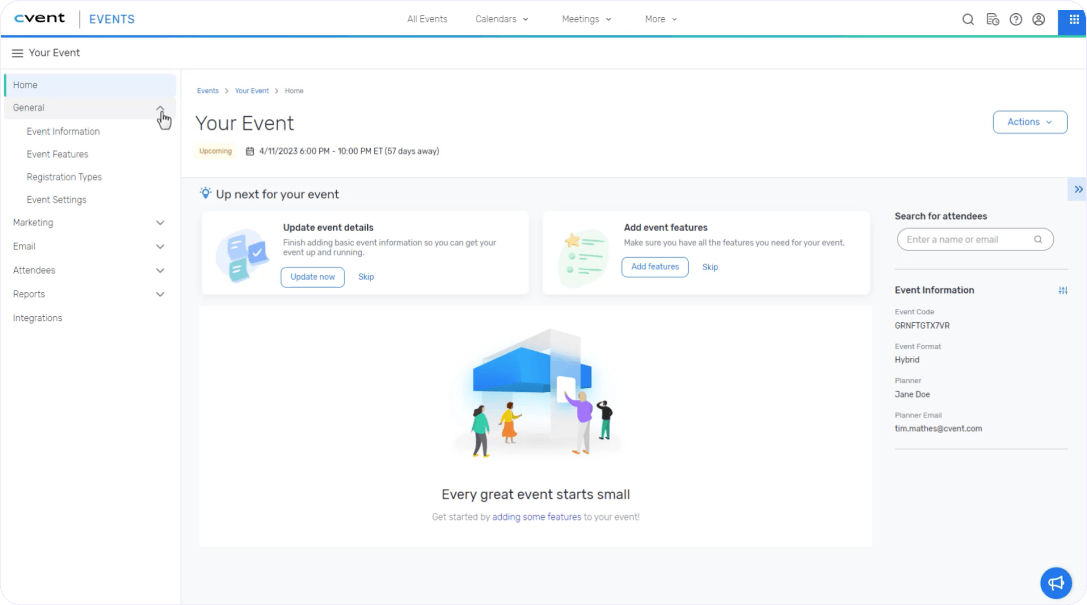
Cvent is an enterprise-level event management platform designed for large corporate conferences and complex events. The platform combines advanced registration capabilities, venue sourcing tools, and comprehensive marketing features to handle sophisticated event requirements at scale.
Key Features:
- Custom registration and ticketing: Allows personalized attendee registration forms, ticket types, and payment integration.
- Venue sourcing and comparison tools: Helps find and compare venues by location, size, and cost, with reviews and availability tracking.
- Integrated email and social media marketing: Automates email campaigns and social media posts to promote the event, with performance tracking.
- Reporting and analytics: Provides real-time data and post-event reports on attendee behavior, ticket sales, and marketing effectiveness.
Pros:
- Advanced venue sourcing capabilities
- Robust registration and ticketing options
- Comprehensive marketing tools
- Excellent reporting and analytics features
Cons:
- Pricing is higher, especially for smaller events
- The interface can be complex for new users
- Tools are sometimes integrated poorly
3. Whova
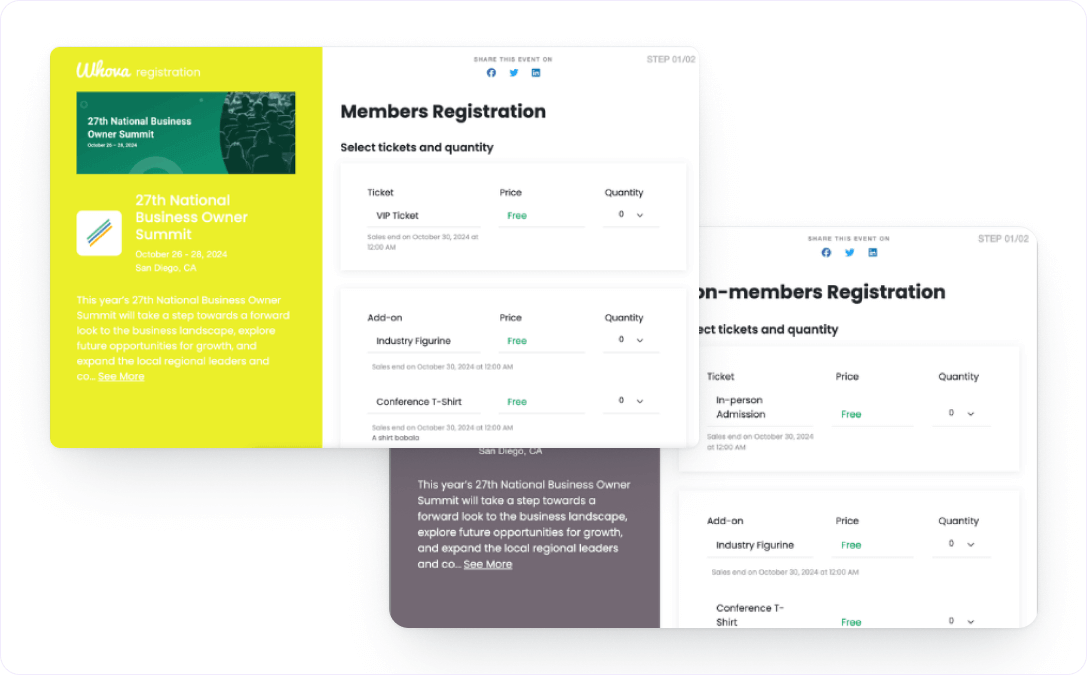
Whova is a user-friendly conference management platform focusing on attendee engagement and networking. It’s best known for its mobile app, which helps attendees build personalized agendas and network with others. It also offers lead generation tools for exhibitors and a range of marketing features to promote events effectively.
Key Features:
- Mobile app for personalized schedules and networking: Lets attendees create custom schedules and connect with others via the event’s mobile app.
- Community board for attendee interaction: A platform where attendees can interact, share ideas, and network with each other.
- Social media and email marketing tools: Tools for scheduling social media posts and sending email campaigns to promote the event.
- Event promotion and custom branding options: Customizable event pages and promotional materials to reflect the event’s branding and attract attendees.
Pros:
- Great for attendee networking
- Easy-to-use mobile app with customizable agendas
- Effective lead generation tools for exhibitors
- Comprehensive marketing and promotional features
Cons:
- May not be ideal for very large conferences
- Costs can rise with premium features
4. RingCentral Events (formerly Hopin)

RingCentral Events is a comprehensive platform for virtual and hybrid conferences.
It offering immersive experiences with AI-powered features, live-streaming capabilities, virtual networking lounges, and interactive engagement tools. The platform supports large-scale events and provides exhibitors with virtual booths for real-time engagement with attendees.
Key Features
- AI-powered event tools: Generate promotional content, manage Q&A sessions, and create social media assets with built-in AI assistance.
- Interactive networking spaces: Enable spontaneous discussions through virtual lounges and topic-based breakout rooms.
- Virtual exhibition tools: Provide customizable booths for sponsors and exhibitors to showcase content.
- App integration hub: Connect with 40+ apps like Kahoot and Slido to enhance engagement.
Pros
- Excellent for virtual and hybrid events
- Strong AI capabilities for content creation and management
- Comprehensive engagement tools
- Scalable for both small and large events
Cons
- Learning curve for utilizing all features
- Premium features can increase costs
5. vFairs
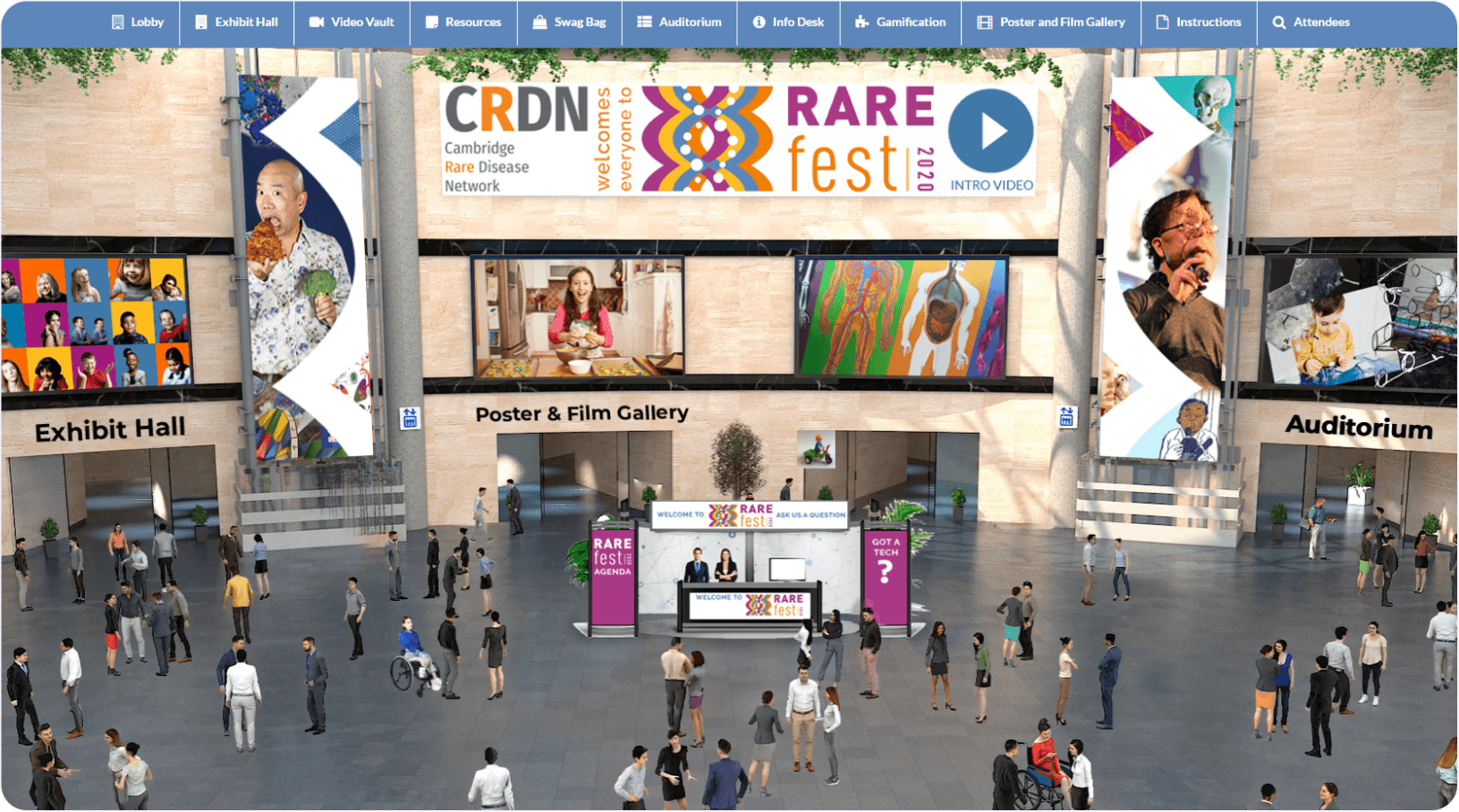
VFairs provides a 3D virtual environment, making it a top choice for hybrid and virtual events. It allows you to create immersive experiences with virtual exhibitor booths, live-streamed sessions, and gamified activities. Exhibitors can showcase products through virtual booths and engage attendees with live chat options.
Key Features
- 3D virtual environments with exhibitor booths: Virtual event spaces with interactive, 3D exhibitor booths for a more immersive experience.
- Live streaming and webinar hosting: Host live-streamed presentations and webinars within the virtual event platform.
- Gamification elements: Add fun, interactive features like leaderboards and scavenger hunts to engage attendees.
- Interactive chat features for networking: Enable attendees to network in real-time through live chat and direct messaging.
Pros
- Immersive virtual event experience
- Great engagement tools for attendees and exhibitors
- Perfect for hybrid events
- Customizable 3D environments
Cons
- Higher cost for fully customized experiences
- May not be ideal for smaller events
6. Eventbrite
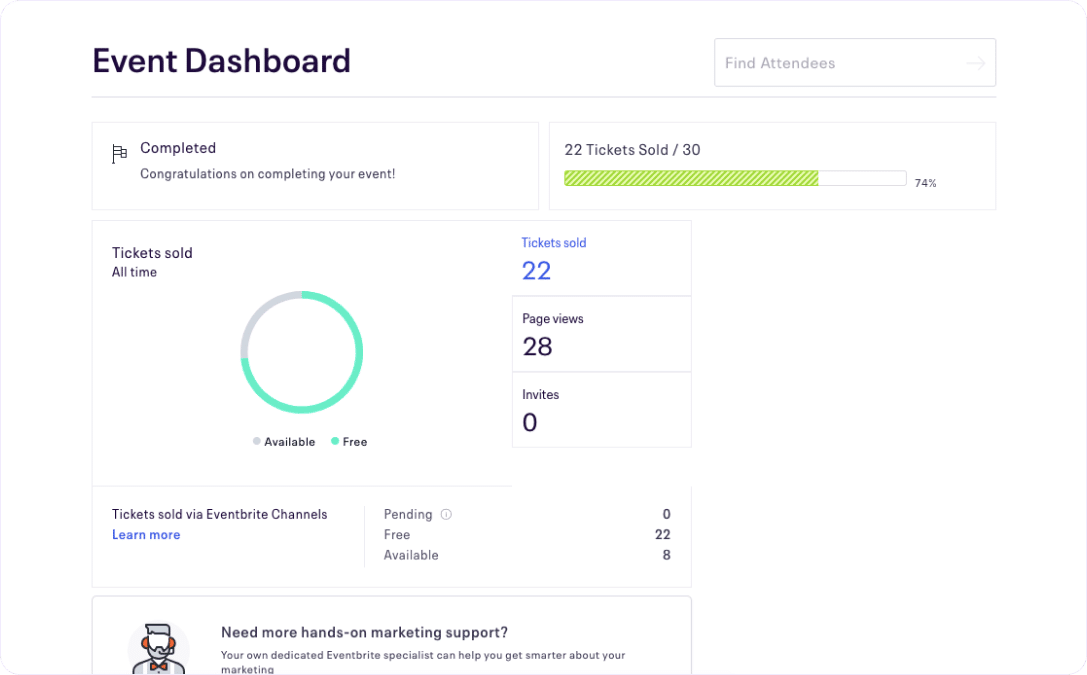
Eventbrite is a well-known event management platform widely used for ticketing and registration for various types of events, including conferences, festivals, and webinars. The simple, user-friendly interface allows event organizers to manage ticket sales, promote events, and check in attendees seamlessly.
Related: Check out our comparison of Cvent and Eventbrite.
Key Features
- Event creation and ticketing: Simple tools for creating events and selling tickets online.
- Customizable registration forms: Create personalized forms to collect specific attendee information.
- Integration with social media and email marketing tools: Connect event platforms with social media and email to promote and engage attendees.
- Real-time reporting: Track ticket sales and event metrics in real-time for better insights and decision-making.
Pros
- User-friendly interface suitable for beginners
- Excellent for ticketing and registration
- Social media integration for event promotion
- Free option for free events
Cons
- Limited customization options for larger conferences
- Advanced features come at a higher cost
7. Bizzabo
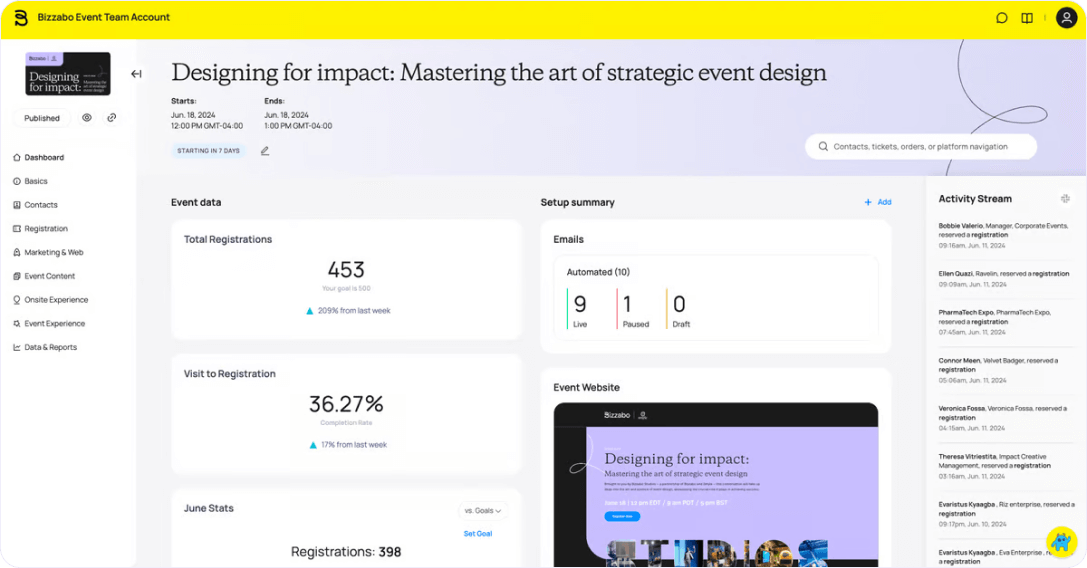
Bizzabo is a high-end event management software designed for hybrid, virtual, and in-person conferences. It offers a variety of tools to help manage registrations, build event websites, and engage attendees. Bizzabo stands out with its focus on personalized experiences and AI-driven insights.
Key Features
- Customizable event websites and registration pages: Create branded websites and registration pages tailored to your event.
- Personalized attendee experiences: Offer customized content and sessions based on attendee preferences and interests.
- AI-powered networking and matchmaking tools: Use AI to connect attendees with relevant contacts or sessions based on their interests.
- Advanced reporting and analytics: Get detailed insights into event performance, attendee engagement, and session popularity.
Pros
- Great for hybrid and large-scale events
- AI-powered networking enhances attendee engagement
- Detailed analytics and insights
- Robust event website customization
Cons
- Higher pricing makes it less accessible for smaller events
- May require a learning curve for full utilization
8. Stova
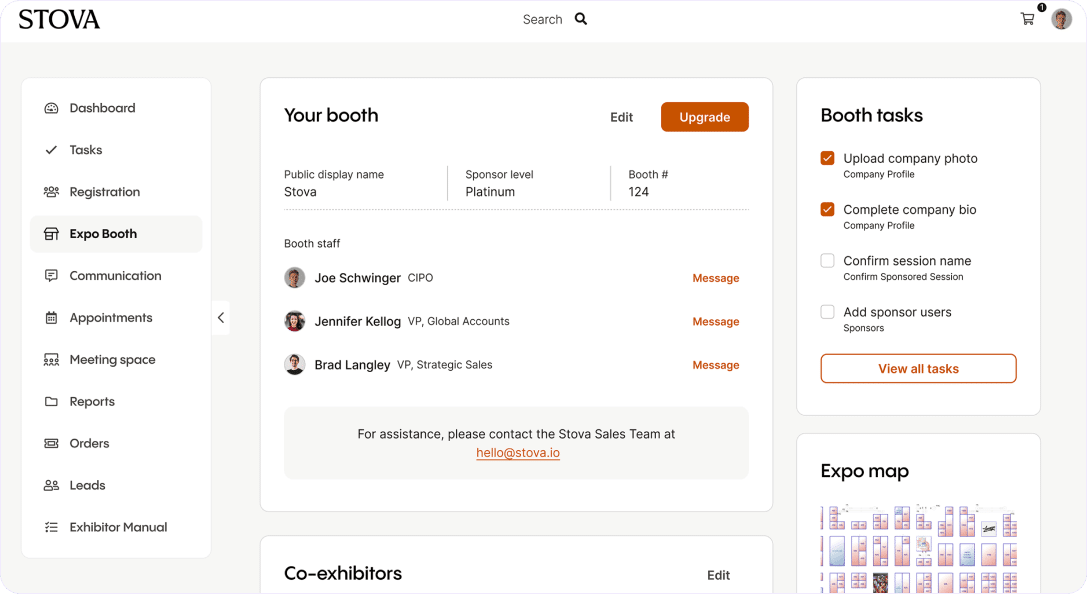
Stova is the result of a merger between MeetingPlay, Aventri, and eventcore. This all-in-one event technology ecosystem serves enterprise-level events and global conferences. The platform specializes in scalable solutions that elevate brand experiences across virtual and in-person events.
Key Features
- Strategic meeting management: Control your entire events portfolio through centralized venue sourcing, budgeting, and planning tools.
- Registration and check-in: Create custom registration workflows with automated communications. Integrate travel booking and enable touchless check-in.
- Virtual and hybrid solutions: Build immersive virtual experiences with branded environments. Connect attendees through AI-powered networking and interactive tools.
- Mobile event apps: Engage attendees with branded mobile apps featuring real-time updates, networking tools, and gamification options.
Pros
- Comprehensive enterprise-level features
- Strong data analytics and reporting
- Scalable for global event portfolios
- Advanced customization options
Cons
- Not all features are well integrated
- Premium enterprise pricing
9. Webex Events (formerly Socio)
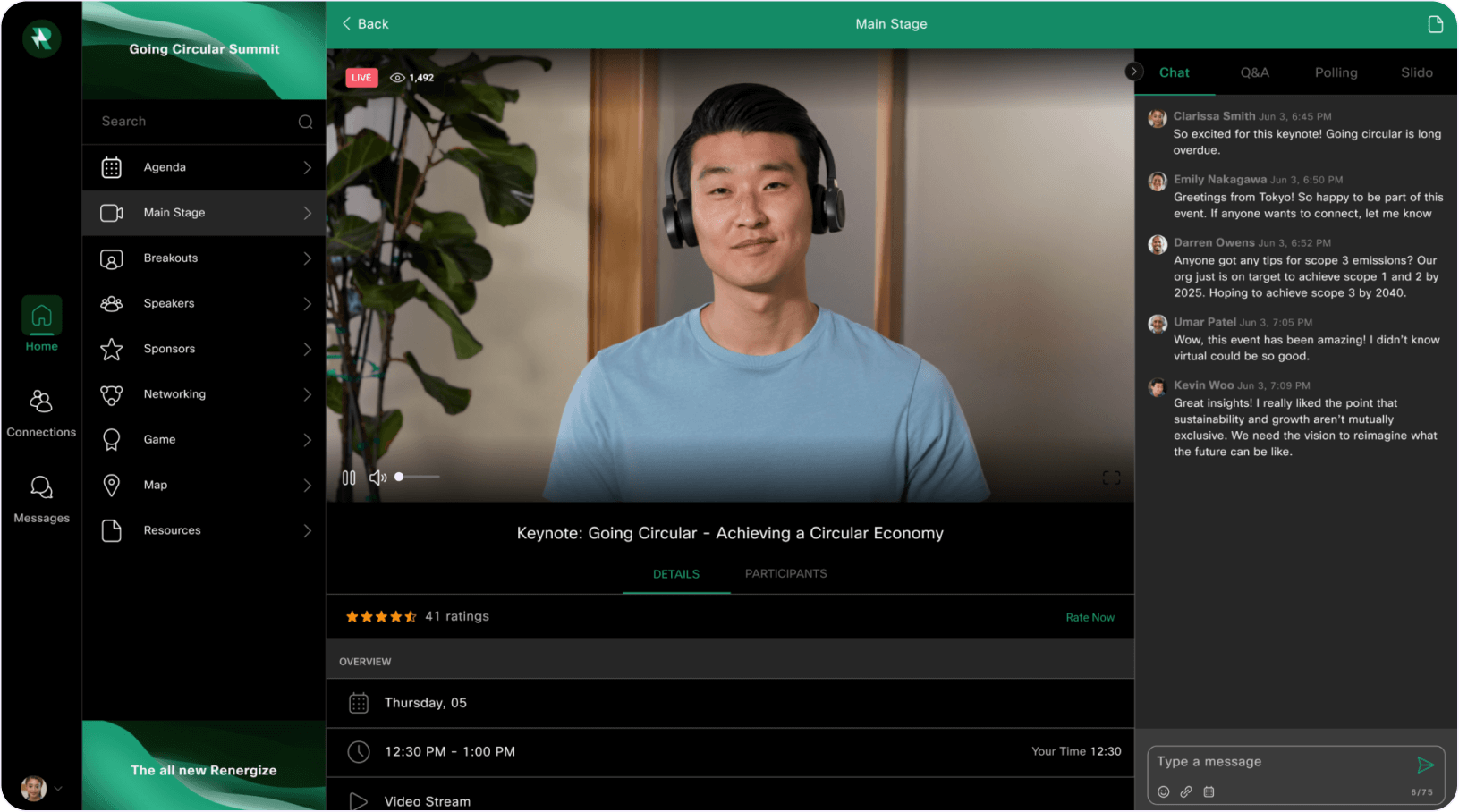
Webex Events is a versatile event management platform for virtual, in-person, and hybrid events. The platform specializes in attendee engagement through features like live chat, Q&A sessions, polls, and networking spaces, while providing straightforward tools for registration and event marketing.
Key Features
- Customizable registration: Create branded, personalized registration forms and ticket options.
- Virtual networking lounges: Provide virtual spaces for attendees to network and connect informally.
- Event marketing tools with social media integration: Promote the event with built-in tools for social media sharing and email campaigns.
- Real-time analytics and reporting: Track attendee engagement, session performance, and event metrics in real-time.
Pros
- Highly engaging for virtual and hybrid events
- Easy-to-use tools for attendee interaction
- Great networking features for attendees
- Intuitive event marketing tools
Cons
- May not have as many features for larger, complex events
- Pricing can increase with premium features
10. Airmeet
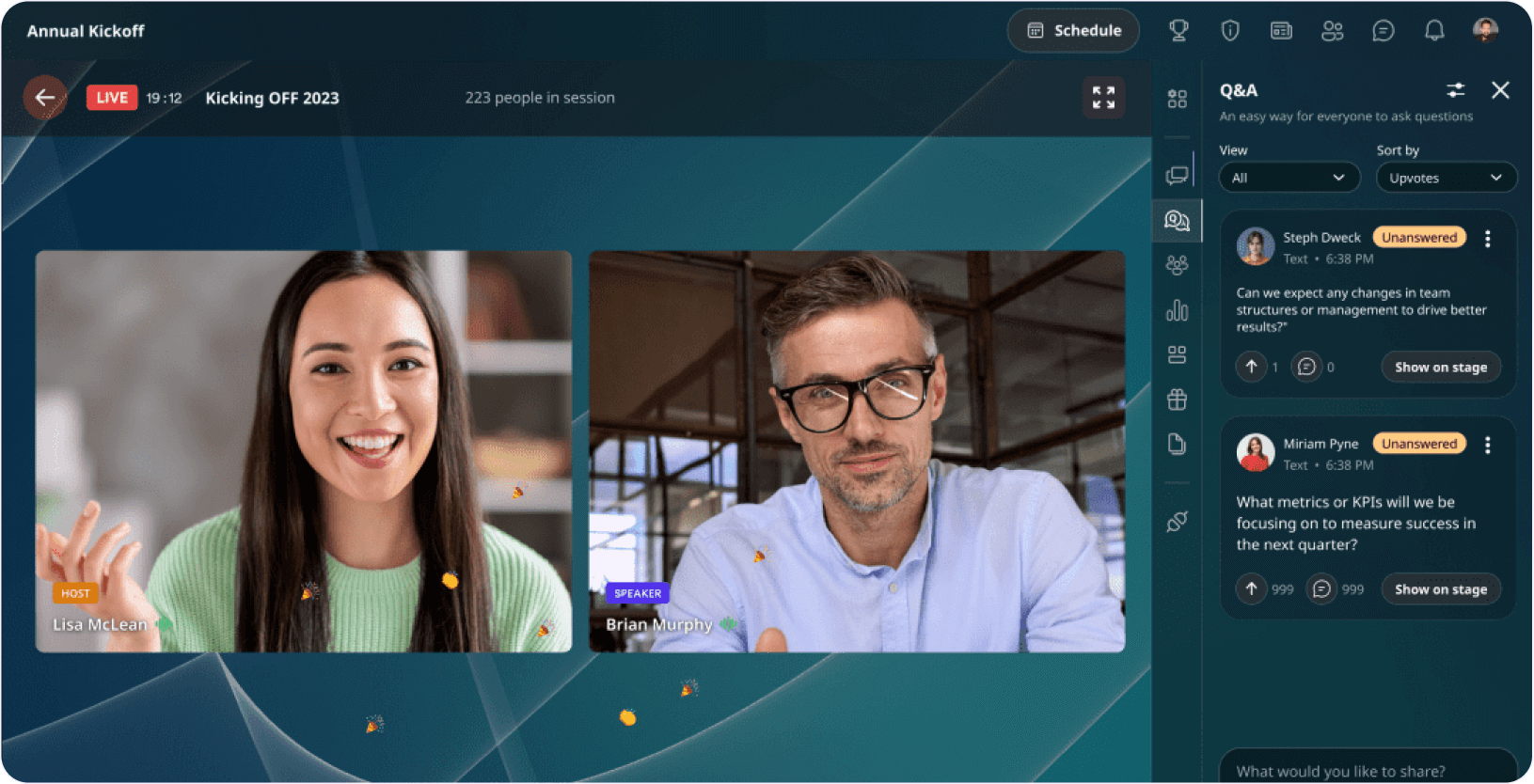
Airmeet specializes in virtual and hybrid conferences, focusing on creating engaging online experiences. The platform excels at facilitating interactive sessions and networking opportunities through virtual spaces that mirror in-person connections.
Key Features
- Virtual networking: Create topic-based tables and breakout rooms for spontaneous discussions.
- Session management: Schedule and run keynotes, panels, and breakout sessions with live streaming.
- Engagement tools: Deploy real-time polls, Q&A sessions, and chat features during presentations.
- Virtual exhibition: Provide customizable booths for sponsors and exhibitors to showcase content.
- Analytics dashboard: Track attendance, engagement metrics, and session performance in real-time.
Pros
- Excellent for virtual and hybrid conferences
- Strong networking and interaction features
- User-friendly platform with intuitive design
- Real-time engagement analytics
Cons
- Limited in-person event management capabilities
- May not be suitable for highly complex conferences
Conclusion
Choosing the right conference management software can transform your event planning process and attendee experience. Each platform offers distinct advantages, whether you need robust virtual capabilities, advanced registration tools, or data-driven insights.
For organizations seeking comprehensive event management without third-party integrations, EventsAir provides an end-to-end native solution. Its versatile platform handles virtual, hybrid, and in-person events of any size, while delivering the engagement features and analytics modern events demand.
Ready to elevate your next event? Contact us today to see how EventsAir can streamline your conference management from start to finish.

